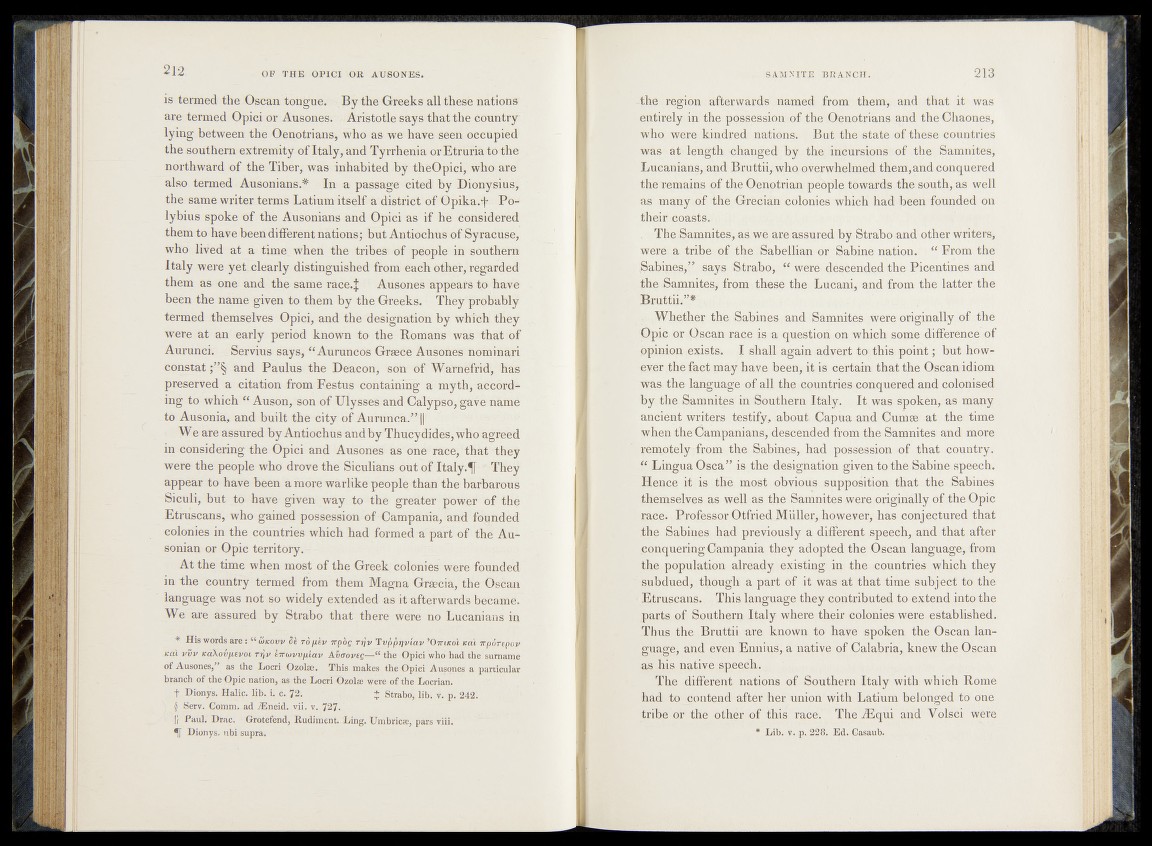
is termed the Oscan tongue. By the Greeks all these nations
are termed Opici or Ausones. «Aristotle says that the country
lying between the Oenotrians, who as we have seen occupied
the southern extremity of Italy, and Tyrrhenia orEtriiria to the
northward of the Tiber,; was inhabited by theOpiei, who are
also termed Ausonians.* In a passage cited by Dionysius,
the same writer terms Latium itself u district of Opika.'f Polybius
spoke of the Ausonians and Opici as if he considered
them to have been different nations; but Antiochus of Sy racuse,
who lived at a time, when the tribes of people in southern
Italy were yet_clearly distinguished from each other, regarded
them as one and the same race.J Ausones appears to have
been the name given to them by the Greeks. They probably
termed themselves Opici, and the designation by which they
were at an early period known to the Romans was that of
Aurunci. Servius says, “ Auruncos Gfaece Ausones nominari
constat and Paulus the Deacon, son of Warnefrid, has
preserved a citation from Festue containing a myth, according
to which “ Auson,Ason of Ulysses and Calypso, gate name
to Ausonia, and built th e city of Aurunca.,,ijp’ *
We are assured by Antiochus and by Thucydides, who agreed
in considering the Opici and Ausones as one race; ‘ that "they
were the people who drove the Siculians out of Italy, They
appear to have been a more warlike people than the barbarous
Siculi, but to have given way to the greater power of thé
Etruscans, who gained possession of Campania, and founded
colonies in the countries which had formed a part of thé Au-
sonian or Opic territory. --
At the time when most of the Greek' colonies were founded
in th e country termed from them Magna Graecia, tlië Oscan
language was not so widely extended as it afterwards became.
We are assured by Strabo that there were no Lucanians in
* words are i “ w ic o v v jiïi r o / i è v ir p à ç r i j v ’ïv fr p itfv la .v ’OiriKoi kcù itp ó r e p o v
Kal vvv KaXovpevoi r i j v ê ir to v v p ia v A v à o v e ç—a the Öpici whó had the sumarnê
of Ausones,” as the Locri Ozolæ. This makes the Opici Auln e s a particular
branch of the Opic nation, as the Locri Ozolæ were of the Locrian.
f pionys. Halic. lib. i, c. 72. . * Strabo, lib, v. p. 242.
\ § Serv. Cómm. ad Æneid. yii. v. 727*
- |i Paul. Drac. Grotefend, Rudiment.Ling. Umbricæ, pars viii.
Dionys. nbi supra.
the region afterwards named from them, and that it was
entirely in the. possession of the Oenotrians and the Chaones,
who were?kindredInations.; But=.the state of these Countries
was ■ at length, changed by the incursions of .the Samnites,
Lucanians, and Bruttii/who overwhelmed them, and conquered
the remains of the Oenptrian people towards the south, as well
US many exf the 'Grecian iicdlonies^which had been founded on
their coasts.
. The Samnites, as we are assured by Strabo and other writers,
were, a tribetiofj th e : Sabellian or Sabine,nation. “ From the
$abip.es,” says Strabo^;,,“ were;!4j©sCended|)fhfe|picnentine&# and
fhe Samnites^ from -these the Lucani, and from the latter the
JBruttii.”*
, Whether the; Sabines and '.Samnites weyepri gin ally of the
Qpic or;.Qscan .race is a q}i|^ |io n on yvjhich some differenc|j|if
opinion ^exists. J. shall again advert totthis;.point;>(but however
the fact may- hay,e been, it is certain that the Oscan idiom
Was. th e'^ aip^ge-pf all the^unferieSvCop.quered,and colonised
Py.fh^^arpni^s in^Sputheru Italy. If,was*s[poken,\as many
aneiept;,writers testify, about Capua ahdxGumse at the. timer
|w;hen<the Campanians,|despendpd from therSamnites; and inbre
imnptelyTrom the Sabines, had of that ’country.
“ Lingua Osca” is the-desighationtgiyen toithe Sabinei speech..
Hend| kit is „the, most, obvious supposition that fhe^Sj$bjnes
themselves as well as the Samnites were originally o f,the Opic
race. Profqpsor Otfried MulIer,Eo^eyer,iEasocorij.ectured tb it
.thp Sabines.; had previously a different,.speech, and.that,after
conquering Campania they adopted; the Oscan language, drom
the population already existing in ^he^ountriesywhich-they
gupduedjji though a part of it .fyasMat that W the
Etruscans. This language, they dnatributed ip, extend into the
parts of; Southern Italy where their colonies-wereestablished.
Thus, the Bruttii are known to huy!e spokep, the; ©scan... language,
and even Ennius, a native of Calajfria,knew tKe^Gscan
as his natiyg,speech.
The different nations vof ^Southern Italy with, which Rome
had to jePntend'after'her union with Latium belonged1 tbrOne,
tribe or the other of th is'ra c e r The:iEq.ui and Volsci were
* Lib. v. p. 228. Ed. Gasaub. v